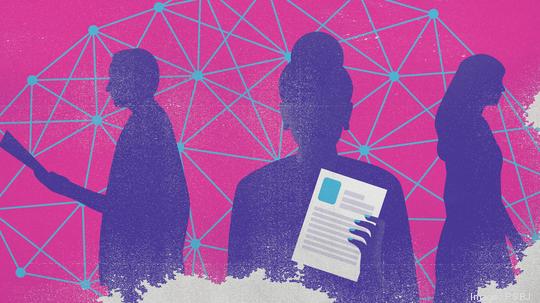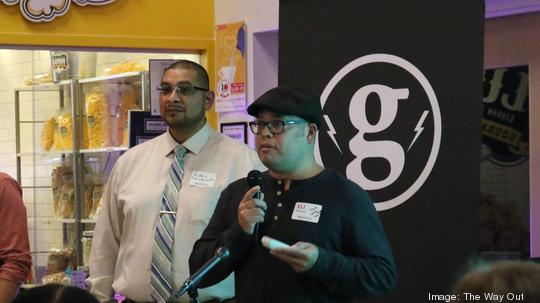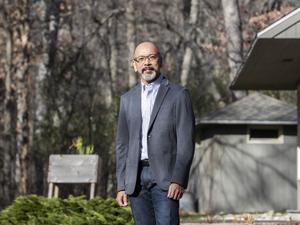
When Ruben Gaona left prison in 2017, he was fortunate enough to land a job through a staffing agency. He felt even more lucky when he was given the opportunity to move up as a case manager within the company. But after passing the exam, a background check uncovered his felony record. The agency informed Gaona there was a year waiting list for the role — and was promptly told to instead apply for a janitor job.
“I went to the car and I was crying,” Gaona said. “I learned I needed to bid on myself. No one else was going to. I realized I was more than the crimes I’d committed.”
At the urging of his wife, Gaona reached out to the company directly and was hired for the role. There was no waitlist — it was just another stigma-riddled roadblock he faced as a justice-involved job seeker, he said.
“Once I landed the case manager position, I saw I wasn’t the only one going through this,” Gaona said. “I came out [of prison] and wanted to help people.”
Gaona is one of the founders at Milwaukee-based The Way Out, an anti-bias jobs platform that aligns previously incarcerated individuals with companies providing second chance employment opportunities.
Together with co-founder Eli Rivera, the social impact startup is on a mission to reduce the region’s high recidivism rates by helping justice-involved job seekers secure gainful employment, while providing re-entry support and resources to keep them on an upward track.

Through the company’s mobile app, candidates receive job seeking and support services. In addition to tracking a candidate’s training, certifications, personality traits, and other accomplishments, the app will also be able to flag stressors — such as unstable housing — that may result in “at-risk” behavior, and connect them to real-time support.
Both Gaona and Rivera have experienced life in the federal prison system, and said they are all too familiar with the emotional and financial hardships that can follow.
Nearly 700,000 formerly incarcerated individuals are released back into society each year, according to the Bureau of Justice, Roughly two-thirds of these individuals return to prison within their first three years of reentry. While many formerly incarcerated individuals are connected to state or local re-entry programming, they are often left to fend for themselves, leaving them overwhelmed by the weight of rebuilding their lives in transition. Parole fees, lack of housing, child support payments, transportation barriers, and fractured family relationships only add to the strain.
Rivera said high recidivism rates can often be tied directly back to barriers in employment.
“They get automatically discouraged, ‘I can’t make ends meet,’” he said. “The external trauma that most folks experience as part of their journey in the prison experience is still with you. Those feelings of ‘less than.’ Especially when all you have to show for it is a low-paying job and people shutting doors.”
That mental stress can lead to criminal thinking, Rivera said. Having the opportunity to make a living wage can make all the difference.
“It’s hard to iron out any other needs if you don’t have an income,” Rivera said. “We thought, ‘How do we build back the integrity of the human being, their self-esteem?’ There’s empowerment in employment.”
The Way Out founders say they met through serendipitous circumstances, when they were both guests at a social impact event addressing recidivism at the Sherman Phoenix in 2019. They were in separate groups, pitching separate ideas, and were briefly introduced by another panelist. Later, Rivera’s wife, a professor at the University of Wisconsin-Milwaukee, who often brought in her husband to speak about his prison and re-entry experience, would tell him about a gregarious student with a similar background. That student was Gaona.
The pair began to develop their idea for a jobs hiring platform and solicited feedback from the region’s reentry service providers. Later, they were accepted into Wisconsin startup accelerator gener8tor’s gAlpha program, a free four-week accelerator. When Covid-19 hit, they decided to go all in.
Gaona said the process was an intimidating experience at first.
“I had a lot to learn about the corporate world,” he said. “It scared me a lot. I used to run a drug organization and now I’m talking to CEOs. In my darkest moments, Eli has always been there. I know the population I’m representing, and they all need to know they are worth something.”
One of The Way Out’s goals is to provide contextualization around a job seekers’ criminal offenses in their candidate profile. Rivera said there’s a significant difference between a 40-year-old single man who commits a robbery and, say, a single mother who commits the same crime out of financial desperation.
Eventually, Rivera and Gaona hope to collect enough data to create an algorithm that will track progress about which types of offenses, jobs, and circumstances determine the best-case scenarios for employees. As they eye a January 2021 launch, The Way Out is aiming to wrap up a second accelerator run with gBeta Milwaukee, and enter pitch competitions to help fuel their venture until they pursue formal funding. Last week, the team received the validation they needed when they won the top prize of $10,000 at the P5 Project & Milky Way Tech Hub Pitch Competition.
“When we came up with an idea to address the hardships of reentering society, it was about getting employers to see the true value of the human being,” Rivera said.
Added Gaona: “It’s about honor, courage and commitment — a one team, one fight mentality. That’s the only way we’re going to fight recidivism.”






